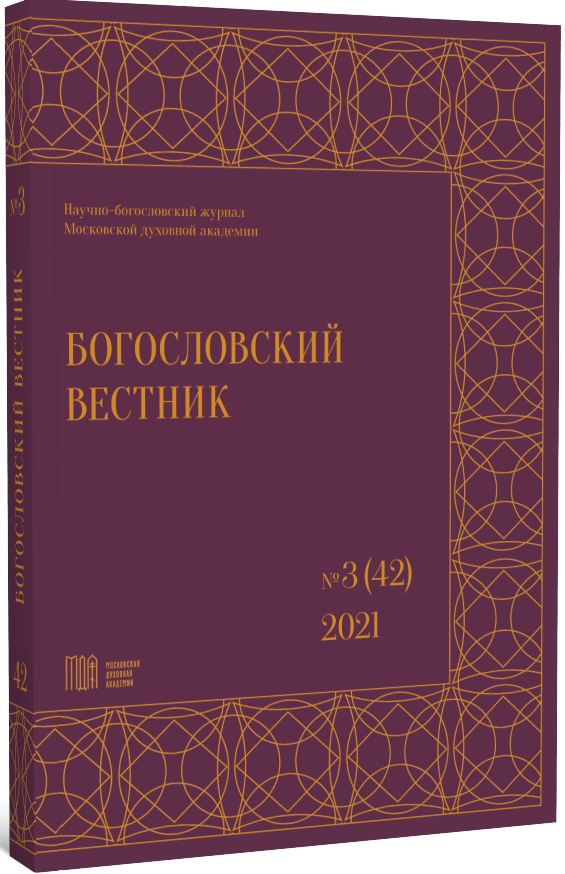The Place of Notions ‘Fault’ and ‘Sin’ in the Worldview of the Ancient Slavs (The Experience of Historical-Cultural Reconstruction of Ideas Based on the Linguistic Data)
DOI:
https://doi.org/10.31802/GB.2021.3.41.015Keywords:
Russian religiosity, the Slavs, sin, fault, moral values, archaic notions, religious ideasAbstract
The article covers the perception peculiarities of the categories of «guilt» and «sin» in the context of the Slavs’ worldview in the pre-Christian era. Linguistic reconstruction, the use of dialectal data, and religious studies analysis of similar concepts allow to conclude that the initial use of the lexeme «guilt» most likely had a legal interpretation and was associated with the restoring of order and compensation for the damage caused. The article identifies an archaic connection between the category of «sin» as a moral mistake and the idea of «curvature» and «blunder», which reveals itself when comparing data from the Slavic and Baltic languages, as well as in the typological analysis of similar models of meaning transfer in several ancient languages. The author points out the presence of an archaic perception of these two, most important for the religious outlook, categories, including in modern folklife. In addition, the article claims that thanks to the translator’s and, more broadly, creative «engineer’s» linguistic activity of the holy Equal-to-the-Apostles brothers Cyril and Methodius, the concepts of «sin» and «guilt», traditional for the Slavic language, received a deeper understanding and were saturated with religious content. This fact serves as one of the examples that demonstrates the specifics of Russian Orthodox religiosity.
Downloads
References
Beekes R. Etymological Dictionary of Greek. Leiden; Boston: Brill, 2010.
Karulis K. Latviešu Etimologijas Vārdnīca. 2 vols. Vol. 1. Riga: Avots, 1992.
Klein E. A Comprehensive Etymological Dictionary of the Hebrew Language for Readers of English. Haifa: The University of Haifa, 1987.
Mоnier-Williams M. A Sanskrit-English Dictionary. Delhi–Varanasi–Patna. Oxford: The Clarendon Press, 1899.
Pokorny J. Indogermanisches Etymologisches Wörterbuch. Bd. 1–3. Bern; München: Francke Verlag, 1959–1969.
The Śiva Purāṇa / ed. J. L. Shastri. Vol. 1–4. Delhi: Motilal Banarsidass Publishers, 1950.
Walde A. Lateinisches Etymologisches Wörterbuch. Heidelberg: Carl Winters Universitätsbuchhandlung, 1954.
Аникин А. Е. Русский этимологический словарь. Вып. 7 (вершь I – вняться II). М.: ИРЯ РАН, 2013.
Аникин А. Е. Русский этимологический словарь. Вып. 12 (грак I – дбать). М.; СПб.; Новосибирск: Ин-т рус. яз. им. В. В. Виноградова РАН; Ин-т филологии Сибирского отделения РАН; Нестор-История, 2018.
Большой толковый словарь русского языка / гл. ред. С. А. Кузнецов; Российская академия наук, Институт лингвистических исследований. СПб.: Норинт, 2003.
Вейсман А. Д. Греческо-русский словарь. [Репринт V-го издания 1899 г.] М.: Греко-латинский кабинет Ю. А. Шичалина, r2020.
Кочергина В. А. Санскритско-русский словарь. М.: Академический проект; Альма Матер, 2005.
Славянские древности. Этнолингвистический словарь: В 5 т. / под общ. ред. Н. И. Толстого. М.: Институт славяноведения РАН; Международные отношения, 1995–2012.
Словарь русских народных говоров. Вып. 7 (гона–депеть). Л.: Наука, 1972.
Срезневский И. И. Материалы для словаря древнерусского языка по письменным памятникам. В 3 т. Т. I. СПб.: Типография Императорской Академии наук, 1893.
Топоров В. Н. Прусский язык. Словарь. В 5 т. М.: Наука, 1975–1990.
Фасмер М. Этимологический словарь русского языка: в 4 т. Т. I. М.: Терра, 1998.
Черных П. Я. Историко-этимологический словарь современного русского языка: в 2 т. Т. 2: Панцирь–Ящур. М.: Русский язык, 1999.
Этимологический словарь славянских языков. Праславянский лексический фонд. М.: Наука, 1974; н. в. Вып. 7 (*golvačь – *gyžati). М., 1980; Вып. 9 (*jьz – *klenьje). М., 1983.
Бенвенист Э. Словарь индоевропейских социальных терминов / пер. с фр., общ. ред. и вступ. ст. Ю. С. Степанова. М.: Прогресс — Универс, 1995.
Верещагин Е. М. История возникновения древнего общеславянского литературного языка. Переводческая деятельность Кирилла и Мефодия и их учеников. М.: Мартис, 1997.
Гамкрелидзе Т. В., Иванов В. В. Индоевропейский язык и индоевропейцы. Реконструкция и историко-типологический анализ праязыка и протокультуры. В 2 ч. Тбилиси: Изд. Тбилисского университета, 1984.
Зализняк А. А. Проблемы славяно-иранских языковых отношений древнейшего периода // Вопросы славянского языкознания. 1962. Вып. 6. С. 28–47.
Иванов М. С. Грех // ПЭ. 2006. Т. 12. С. 330–345.
Корытко О., прот. Homo religiosus: на путях поиска истины. Авторский курс лекций по «Истории нехристианских религий». М.: Изд. Сретенского монастыря, 2017.
Лосский Н. О. Характер русского народа. Frankfurt am Main: Посев, 1957.
Отто Р. Священное. Об иррациональном в идее божественного и его соотношении с рациональным / пер. с нем. яз. А. М. Руткевич. СПб.: Изд. Санкт-Петербургского университета, 2008.
Элиаде М. Священное и мирское / пер. с фр., предисл. и коммент. Н. К. Гарбовского. М.: МГУ, 1994.
Элиаде М. Трактат по истории религий / пер. с фр. А. А. Васильева. СПб.: Алетейя, 1999. Т. 1; Т. 2.
Yagić V. Karl Brugmann und Berthold Delbrück, Grundriss der vergleichenden Grammatik der indogermanischen Sprachen // Archiv für slavische Philologie. 1898. № 20. S. 367–374.
Mallory J. P., Adams D. Q. The Oxford Introduction to Proto-Indo-European and the Proto-Indo-European World (Oxford Linguistics). Oxford: Oxford University Press, 2006.
Meillet A. Études sur l’Étymologie et le Vocabulaire du Vieux Slave. Paris: Libraire Émile Bouillon, 1902–1905.
Downloads
Published
How to Cite
License

This work is licensed under a Creative Commons Attribution-ShareAlike 4.0 International License.








